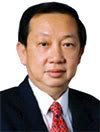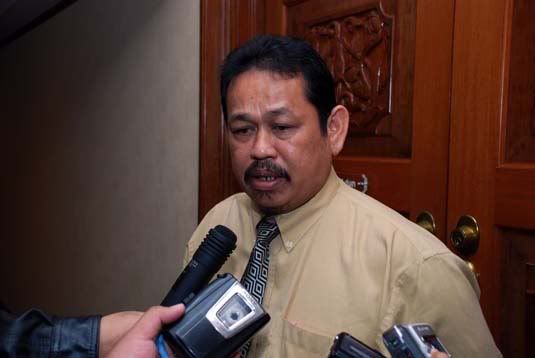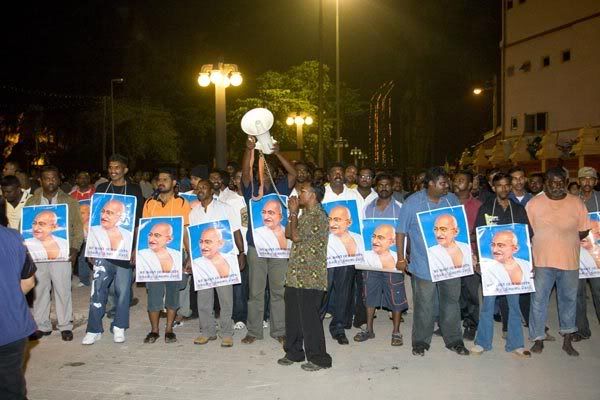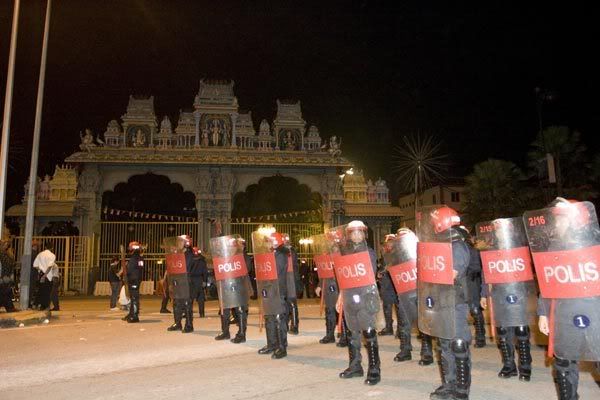Quote:
"Racial abuse was not unusual.
It used to lead me to wonder how long do you have to be here, how much do you have to love this country before you are accepted?"
-Penny Wong, Australian Federal Cabinet Minister
 Penny Wong, 39, born in Malaysia, becomes the first Chinese-Australian Cabinet Minister, with responsibility for climate change and water in Kevin Rudd's newly formed Federal Government.
Penny Wong, 39, born in Malaysia, becomes the first Chinese-Australian Cabinet Minister, with responsibility for climate change and water in Kevin Rudd's newly formed Federal Government.Penny was born in Sabah, Malaysia. She moved to Australia when she was eight and settled in the Adelaide Hills. She won a scholarship to Scotch College and obtained a Bachelor of Arts Degree and a Law Degree (Hons) from the University of Adelaide.
Penny began working for the Construction, Forestry, Mining and Energy Union when she was still studying and stayed with the union after she was admitted to the Bar. She became an elected organiser and industrial officer.
She was then employed as a ministerial advisor to the Carr government in New South Wales, concentrating on forest policy. She later returned to Adelaide to practise law.
Positions in the Labour Party
Delegate, ALP State Convention (SA) 1989-94 and from 1996.
Deputy Chair, ALP Platform Committee (SA) 1990-94.
Member, ALP State Executive (SA) 1996-99.
Member, ALP National Policy Committee on Industry, Infrastructure and Regional Development 1998-2000.
Delegate, ALP National Conference 2000.
Qualifications and Occupation before entering Federal Parliament
BA, LLB (Adel), GradDip in Legal Practice (SA).
Industrial officer 1990-96.
Barrister and solicitor 1996-2000.
Legal officer 2000-02.
Wong was born to a Chinese Malaysian father and an Australian mother. After spending a year on exchange in Brazil, Wong studied Arts/Law at the University of Adelaide. While at university, she worked part time for the Construction, Forestry, Mining and Energy Union.
She also became involved in political activism at university, winning a position on the National Executive of the National Union of Students. In 1988, Wong joined the Australian Labor Party, winning a position as a delegate to the party's state convention the following year. She has been a delegate each year since, with the exception of 1995.
Wong graduated from university in 1992, and continued on with the CFMEU, working as an industrial officer, gaining admission to the bar in 1993. During 1995 and 1996, she acted as an advisor to the New South Wales state government, specialising in the area of forest policy. On returning to Adelaide, she began practising law, won a position on the ALP's state executive, and also took on work as a legal officer with the Liquor, Hospitality and Miscellaneous Union.
Wong ran for pre-selection for the Senate in 2001, and was selected for the top spot on the party's South Australian ticket, as a result of affirmative action policies and factional changes. Wong is a member of EMILY's List Australia, the support network for Labor women, and currently sits on a number of Senate committees, primarily those related to economics.
She has been a vocal critic of Prime Minister John Howard's ban on same-sex marriages, despite the ban also having the support of her own party.
In June 2005 Wong was appointed Shadow Minister for Employment and Workforce Participation and Shadow Minister for Corporate Governance and Responsibility.
Following the reshuffle in December 2006, she became responsible for the portfolios of Public Administration & Accountability, Corporate Governance & Responsibility, and Workforce Participation.
In November 2007, in the wake of the Labor Party victory in the 2007 election, Wong was appointed Minister for Climate Change and Water. She will accompany Prime Minister Kevin Rudd to Bali for the international climate change talks.
Father's Pride and Joy.
Read here for more
Pride and joy was all over the face of the father of Malaysian-born Penny Wong Ying Yen who has been appointed as a cabinet minister in Australia.
“I am very happy. I hope her appointment will be a blessing for Australia,” said Penny’s father Francis Wong Yit Shing, 66, an architect here.
The 39-year-old Penny, who was born in Sabah but grew up in Australia from the age of eight with her mother, was named Climate Change and Water Minister Thursday by Prime Minister Kevin Rudd whose Labour party won the recent elections.
Francis, who described his daughter as a go-getter, said that the portfolio given to his daughter was very “current and important” not only for Australians but for the people around the world who are concerned about global warming and climate change.
“I know she is a very responsible person and she will work hard to achieve her objectives,” said the father, who keeps in touch with his daughter through SMS.
Describing his daughter as a person with strong personality, he said that he never expected Penny to become a politician.
“I wanted her to be a doctor and she enrolled for it but a year later she switched to law after she went on a student exchange programme to Brazil where she saw the need to help people,” said Francis.
On completing her studies, she got involved in unions and industrial court cases in Australia and “I believe that the Labour Party spotted her capability and urged her join them.”
Penny became the first Asian-born woman Senator when she won a seat in South Australia in 2002 and last week’s Australian elections saw her winning a second term with her party toppling John Howard’s government.
Asked if he had ever given his daughter any political advice, Francis said that the politics that he knew about was only that of South East Asia and that “Australian politics (is) totally different.”
“ We mostly talk family matters ... not much on politics though I always follow developments of her career,” he said, adding that Penny is an outdoor person who has among others, scaled Mount Kinabalu several times and dived in Sipadan.
Francis said Penny and her mother left Sabah for Australia in 1977 for Penny’s education while he remained in the state. Over time, he and his wife separated with Penny taking up her mother’s Australian citizenship.
LABOUR'S RISING STAR
Read here in Sydney Morning Herald
IN MANY ways Penny Wong's is a very Australian story.
The woman who can trace her family back to 1836 and one of South Australia's original settlers was born in Malaysia and moved to Australia as a seven-year-old .
Yesterday the 39-year-old former lawyer was catapulted from relative obscurity to one of the most important jobs in the Rudd administration as minister for climate change and water.
Senator Wong now has a flash parliamentary office, a soon-to-be-expanded staff and responsibility for international climate change negotiations, carriage of an emissions trading system and, with Peter Garrett, is one of two ministerial guardians of the environment.
"Climate change is one of the biggest challenges confronting Australia and, indeed, our planet. It is a challenge not only to our environment, but also to our economy, our jobs, and our way of life," Senator Wong said yesterday.
All this came barely five years after the day Senator Wong got to her feet to make her maiden speech to the Senate, a moment when her thoughts turned to her late grandmother, a woman she called Poh Poh.
"She was a diminutive woman, with an indomitable spirit. A Chinese woman of the Hakka or guest people, she was my grandfather's second wife. When the war came to Malaysia she and the rest of the family were in Sandakan, a name that many who fought in Australia's defence will be familiar with," Senator Wong said.
"Most of the family died during the war, and she was left alone to care for my father and his siblings in unspeakable circumstances, which she did through extraordinary determination and a will to survive. She was barely literate, humble and compassionate, but the strongest person I have ever known. Her name was Madam Lai Fung Shim, and that her grand-daughter is here today would have been a source of pride but probably some consternation to her."
As the maelstrom of Pauline Hanson intensified Senator Wong was busily working at becoming the first Asian-born woman elected to Parliament.
She won her spot at the November 2001 election and took her seat the following July. Before politics she was a lawyer, a Carr government adviser and a proud trade unionist.
She joined the shadow ministry in 2004 in the relatively low profile portfolios of employment and workforce participation, corporate governance and public administration and accountability.
Kevin Rudd made her the spokeswoman for Labor's election campaign but big things were expected of her long before that.
Senator Wong's reputation came from her membership of committees designed to hold public servants and politicians to account.
She relished dissecting those who appeared before her.
Her appearances on the ABC's Lateline won a solid fan base among news and political junkies and anyone else who watches current affairs late on Friday night.
In that first speech Senator Wong spoke harshly of Ms Hanson, of John Howard's tolerance of her views, and of everyone else who made growing up as an Australian who looked a bit different so tough.
"Racial abuse was not unusual. It used to lead me to wonder how long do you have to be here, how much do you have to love this country before you are accepted?"
FULL LIST OF KEVIN RUDD'S FEDERAL MINISTRY
CABINET
Kevin Rudd
Prime Minister
Julia Gillard
Deputy Prime Minister, Minister for Education, Employment and Workplace Relations
Wayne Swan
Treasurer
Lindsay Tanner
Minister for Finance
Peter Garrett
Minister for the Environment, Heritage and the Arts
Penny Wong
Minister for Climate Change and Water
Anthony Albanese
Minister for Infrastructure, Transport, Regional Development and Local Government
Kim Carr
Minister for Innovation, Industry, Science and Research
Martin Ferguson
Minister for Resources, Energy and Tourism
Tony Burke
Minister for Agriculture, Fisheries and Forestry
Simon Crean
Minister for Trade
Nicola Roxon
Minister for Health and Ageing
Jenny Macklin
Minister for Families, Housing, Community Services and Indigenous Affairs
Stephen Smith
Minister for Foreign Affairs
Joel Fitzgibbon
Minister for Defence
Robert McClelland
Attorney-General
Chris Evans
Minister for Immigration and Citizenship
Government Senate leader
Stephen Conroy
Broadband communications and the digital economy
John Faulkner
Special Minister for State
Cabinet Secretary
OUTER MINISTRY
Nick Sherry
Minster for Superannuation and Corporate Law
Craig Emerson
Minister for Small Business, Independent Contractors and the Service Economy
Minister Assisting the Finance Minister on business deregulation
Brendan O'Connor
Minister for Workforce Participation
Tanya Plibersek
Minister for Housing and the Status of Women
Joseph Ludwig
Minister for Human Services
Manager for Government Business in the Senate
Bob Debus
Minister for Home Affairs
Alan Griffin
Minister for Veterans Affairs
Warren Snowdon
Minister for Defence and Science Personnel
Justine Elliott
Minister for Ageing
Kate Ellis
Minister for Youth and Sport
Chris Bowen
Assistant Treasurer and Minister for Competition Policy and Consumer Affairs
PARLIAMENTARY SECRETARIES
Maxine McKew
Parliamentary Secretary to the Prime Minister
Greg Combet
Parliamentary Secretary to the Minister for Defence
Bill Shorten
Parliamentary Secretary to the Minister for Families, Housing, Community Services and Indigenous Affairs
Mike Kelly
Parliamentary Secretary for Defence
Gary Gray
Parliament Secretary to the Minister for Infrastructure, with responsibility for northern and regional Australia
Bob McMullan
Parliamentary Secretary for International Development Assistance
Duncan Kerr
Parliamentary Secretary for the Pacific
Laurie Ferguson
Parliamentary Secretary for Multicultural Affairs and Settelment Programs
Ursula Stephens
Parliamentary Secretary for Social Inclusion
Anthony Byrne
Parliamentary Secretary to the Prime Minister
John Murphy
Parliamentary Secretary to the Minister for Trade




